Templeton Prize
International award for affirming life's spiritual dimension From Wikipedia, the free encyclopedia
The Templeton Prize is an annual award granted to a living person, in the estimation of the judges, "whose exemplary achievements advance Sir John Templeton's philanthropic vision: harnessing the power of the sciences to explore the deepest questions of the universe and humankind's place and purpose within it." It was established, funded and administered by John Templeton starting in 1972. It is now co-funded by the John Templeton Foundation, Templeton Religion Trust, and Templeton World Charity Foundation, and administered by the John Templeton Foundation.[1]
| Templeton Prize | |
|---|---|
 Bernard d'Espagnat receiving the Templeton Prize from the Duke of Edinburgh in 2009 | |
| Awarded for | Outstanding contributions in affirming life's spiritual dimension, whether through insight, discovery, or practical works |
| Country | United States |
| Presented by | Templeton Foundation |
| Reward(s) | £1.1 million (2019) |
| First award | 1973 |
| Currently held by | Ecumenical Patriarch Bartholomew |
| Website | templetonprize |
The prize was originally awarded to people working in the field of religion (Mother Teresa was the first winner), but in the 1980s the scope broadened to include people working at the intersection of science and religion.[2] Until 2001, the name of the prize was "Templeton Prize for Progress in Religion", and from 2002 to 2008 it was called the "Templeton Prize for Progress Toward Research or Discoveries about Spiritual Realities".[3][4] Hindus, Christians, Jews, Buddhists and Muslims have been on the panel of judges and have been recipients of the prize.[5]
The monetary value of the prize is adjusted so that it exceeds that of the Nobel Prizes; Templeton felt, according to The Economist, that "spirituality was ignored" in the Nobel Prizes.[6] As of 2019[update], it is £1.1 million.[7] It was typically presented by Prince Philip, during his lifetime, in ceremonies held at Buckingham Palace.[8]
The prize has been referred to as prestigious[9] and coveted,[10] with The Washington Post calling it the most prestigious award in religion.[11] Atheist scientists Richard Dawkins,[12] Harry Kroto[13] and Jerry Coyne have criticized the prize as "blurring [religion's] well-demarcated border with science" and being awarded "to scientists who are either religious themselves or say nice things about religion",[14] a criticism rejected by 2011 laureate Martin Rees, who pointed to his own and other laureates' atheism and that their research in fields such as psychology, evolutionary biology, and economy can hardly be classified as the "promotion of religion".[14]
Laureates
| Year | Laureate | Notes | Ref(s) | |
|---|---|---|---|---|
| 1973 |  |
Mother Teresa | Founder of the Missionaries of Charity; 1979 Nobel Peace Prize laureate | [15] |
| 1974 | 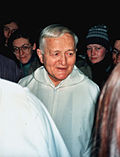 |
Frère Roger | Founder of the Taizé Community | [16] |
| 1975 |  |
Sarvepalli Radhakrishnan | Former President of India, advocate of non-aggression with Pakistan | [16] |
| 1976 |  |
Leo Joseph Suenens | Pioneer in the Catholic Charismatic Renewal movement | [17] |
| 1977 |  |
Chiara Lubich | Founder of the Focolare Movement | [18] |
| 1978 | — |
Thomas F. Torrance | Former Moderator of the General Assembly of the Church of Scotland | [17] |
| 1979 |  |
Nikkyō Niwano | Co-founder of the Risshō Kōsei Kai | [17] |
| 1980 | — |
Ralph Wendell Burhoe | Founder of the journal Zygon | [19] |
| 1981 |  |
Cicely Saunders | Founder of the hospice and palliative care movement | [20] |
| 1982 |  |
Billy Graham | Evangelist | [21] |
| 1983 |  |
Aleksandr Solzhenitsyn | Soviet dissident novelist; Nobel laureate | [21] |
| 1984 | — |
Michael Bourdeaux | Founder of the Keston Institute | [16] |
| 1985 | — |
Sir Alister Hardy | Founder of the Religious Experience Research Centre | [22] |
| 1986 | — |
James I. McCord | Former president, Princeton Theological Seminary | [23] |
| 1987 |  |
Stanley Jaki | Benedictine priest; professor of astrophysics, Seton Hall University | [21] |
| 1988 | — |
Inamullah Khan | Former secretary-general, Modern World Muslim Congress | [24] |
| 1989 |  |
Carl Friedrich Freiherr von Weizsäcker[a] | Physicist and philosopher | [17] |
— |
George MacLeod[a] | Founder of the Iona Community | [26] | |
| 1990 |  |
Baba Amte[b] | Developer of modern communities for people suffering from leprosy | [27] |
— |
Charles Birch[b] | Emeritus professor, University of Sydney | [28] | |
| 1991 |  |
Immanuel Jakobovits, Baron Jakobovits | Former Chief Rabbi of Great Britain and the Commonwealth | [17] |
| 1992 |  |
Kyung-Chik Han | Evangelist and founder of Youngnak Presbyterian Church, Seoul. From northern Korea. | [29] |
| 1993 | 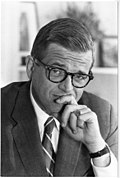 |
Charles Colson | Founder of the Prison Fellowship | [16] |
| 1994 |  |
Michael Novak | Philosopher and diplomat | [16] |
| 1995 |  |
Paul Davies | Theoretical physicist | [30] |
| 1996 |  |
Bill Bright | Founder of the Campus Crusade for Christ | [31] |
| 1997 | — |
Pandurang Shastri Athavale | Social reformer and philosopher, founder of the Swadhyay Movement | [31] |
| 1998 | — |
Sir Sigmund Sternberg | Philanthropist; founder of the Three Faith Forum | [16] |
| 1999 | — |
Ian Barbour | Former professor of science, technology and society, Carleton College | [32] |
| 2000 |  |
Freeman Dyson | Theoretical and mathematical physicist, mathematician, and statistician | [32] |
| 2001 | — |
Arthur Peacocke | Former dean, Clare College, Cambridge | [33] |
| 2002 | 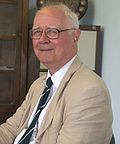 |
John Polkinghorne | Physicist and theologian | [16] |
| 2003 |  |
Holmes Rolston III | Philosopher | [34] |
| 2004 |  |
George F. R. Ellis | Cosmologist and philosopher | [35] |
| 2005 |  |
Charles Hard Townes | Nobel laureate and physicist | [15] |
| 2006 |  |
John D. Barrow | Cosmologist and theoretical physicist | [36] |
| 2007 |  |
Charles Taylor | Philosopher | [12] |
| 2008 |  |
Michał Heller | Physicist and philosopher | [37] |
| 2009 |  |
Bernard d'Espagnat | Physicist | [38] |
| 2010 |  |
Francisco J. Ayala | Biologist | [39] |
| 2011 | 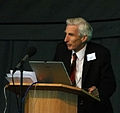 |
Martin Rees, Baron Rees of Ludlow | Cosmologist and astrophysicist | [40] |
| 2012 |  |
14th Dalai Lama, Tenzin Gyatso | Spiritual leader of Tibetan Buddhism, and 1989 Nobel Peace Prize laureate | [41] |
| 2013 | 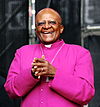 |
Desmond Tutu | Nobel laureate, social rights activist and retired Anglican archbishop | [42] |
| 2014 |  |
Tomáš Halík | Roman Catholic priest, theologian, philosopher | [43] |
| 2015 |  |
Jean Vanier | Catholic theologian, humanitarian and founder of L'Arche and Faith and Light | [44] |
| 2016 | 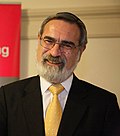 |
Jonathan Sacks | Former Chief Rabbi of Great Britain, philosopher, and scholar of Judaism | [45] |
| 2017 |  |
Alvin Plantinga | American scholar, philosopher, and writer | [46] |
| 2018 |  |
Abdullah II of Jordan | King of Jordan | [47] |
| 2019 | 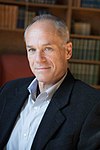 |
Marcelo Gleiser | Brazilian physicist and astronomer, Professor of Physics and Astronomy at Dartmouth College | [48][49] |
| 2020 |  |
Francis Collins | Geneticist and physician | [50] |
| 2021 |  |
Jane Goodall | Ethologist, activist and renowned chimpanzee researcher | [51] |
| 2022 |  |
Frank Wilczek | Theoretical physicist | [52] |
| 2023 |  |
Edna Adan Ismail | Health care advocate | [53] |
| 2024 |  |
Pumla Gobodo-Madikizela | Psychologist | [54] |
See also
Notes
References
External links
Wikiwand - on
Seamless Wikipedia browsing. On steroids.
